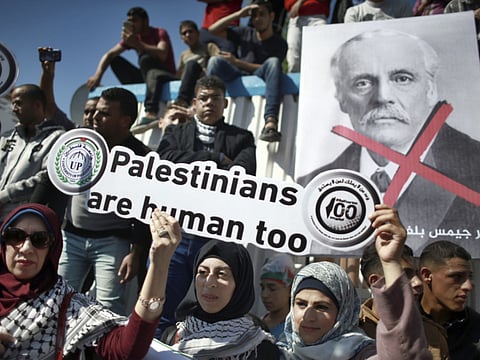Palestinians scoff at Balfour celebrations
Britain should feel ashamed and stigmatised because of this promise and not hold celebrations, Palestinians say

London: In a 67-word statement composed 100 years ago, Britain endorsed the establishment of a Jewish homeland in the Middle East, triggering a process that would culminate in the creation of Israel - and with it one of the world’s most intractable conflicts.
On Thursday British and Israeli leaders commemorated the centenary of that statement, known as the Balfour Declaration after the foreign minister who penned it, with a banquet in the gilded halls of London’s Lancaster House mansion.
But as Prime Minister Theresa May and Israel’s Benjamin Netanyahu dined, protesters gathered to demand that Britain acknowledge the suffering they say the declaration has caused to Palestinian people, and recognise their claim to statehood.
“The reason it is getting so much attention is because the conflict which it launched ... is still very much in existence and there is a sense, particularly on the Palestinian side, of continuing injustice,” said Ian Black, an academic at the London School of Economics.
“It really is an issue which is alive and toxic and bitterly divisive.”
While Israel reveres Arthur Balfour, naming streets and a Tel Aviv school after him, Palestinians decry his declaration as a promise by Britain to hand over land it did not own.
The contested declaration is at the root of the Israeli-Palestinian territorial conflict which, after several wars and decades of international diplomacy, remains unsettled.
Marches were held in the West Bank cities of Ramallah and Nablus and in Gaza.
Protesters waved Palestinian flags and held banners demanding Britain rectify its “historical sin”.
In Gaza, Ahmad Helles, a senior official from President Mahmoud Abbas’s Fatah movement, said: “Britain should feel ashamed and stigmatised because of this promise and not hold celebrations.”
“I believe it (the declaration) demands of us today a renewed resolve to support a lasting peace that is in the interests of both Israelis and Palestinians – and in the interests of us all,” May said.
Britain held Palestine, which had been under Ottoman Turkish rule, from 1922 until after the end of World War Two.
Israel declared independence in 1948, at the end of British Mandatory rule and after the UN General Assembly voted in 1947 in favour of a plan, rejected by Palestinian representatives, to partition Palestine into an Arab state and a Jewish state.
Palestinians refer to the creation of the Israeli state as Al Nakba or the catastrophe as thousands of Palestinians were uprooted from their homes in what is now Israel.
The ensuing regional conflict, played out over a series of wars fought along Arab-Israeli lines, has left the Palestinians seeking to establish an independent state in territories captured and illegally occupied by Israel in the 1967 war.
Thursday’s commemoration, culminating in the dinner hosted by descendants of Balfour and of the recipient of his declaration, Jewish community leader Walter Rothschild, requires Britain to strike a delicate diplomatic balance.
Britain regards Israel as a close and important ally, and supports international efforts to find a peaceful solution that results in separate Israeli and Palestinian states.
Attempting to strike the right balance, Johnson on Monday praised the declaration for helping to create a “great nation”, but he also said the spirit of the declaration had not been fully realised.
He was referring to a clause in the document which said nothing should prejudice the civil and religious rights of existing non-Jewish communities.
Israelis who were celebrating the anniversary on Thursday conveniently ignore that clause.
“While the state would not have arisen without settlement, sacrifice and a willingness to fight for it, the international impetus was undoubtedly the Balfour Declaration,” Netanyahu told a meeting of his cabinet ahead of his visit to London.
Palestinian lawmakers in the Israeli parliament said they would boycott the celebrations, and protests are planned across several days in London by organisations pledging solidarity with the Palestinians.
Abbas used an article in Britain’s Guardian newspaper to reiterate calls for the British government to acknowledge the declaration as a mistake.
“The creation of a homeland for one people resulted in the dispossession and continuing persecution of another – now a deep imbalance between occupier and occupied,” he wrote.
“The balance must be redressed, and Britain bears a great deal of responsibility in leading the way.”
Britain has refused previous Palestinian demands for an apology and does not recognise Palestine as a state.
Johnson said on Monday Britain would be willing to offer recognition, but wanted to time it to give maximum impetus to peace efforts.
Sign up for the Daily Briefing
Get the latest news and updates straight to your inbox


